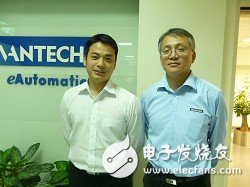With the gradual transformation of social structure, the call of the standard enterprises, and the policies of governments, industrial automation has begun to add many “smart†elements, moving towards intelligent automation, not only making the word “smart†more popular, but also making it more popular. The development profile of unmanned factories has become more specific. Huang Yijia, senior associate of Advantech's industrial automation group, said that industrial automation originally demanded standard processes and mass production. However, in recent years, the industrial sector has gradually evolved into a small number of sophisticated manufacturing models, coupled with communications, The rapid development of sensing and cloud technology has made the production model in the factory further move toward the intelligent manufacturing of intelligent automation. Right is Huang Yijia, senior associate of Advantech's industrial automation business group; left is Li Jingen, business manager of Advantech's Taiwan business unit. Huang Yijia further said that the topic of industrial intelligent automation has been attracting more and more attention recently, mainly due to the promotion of government policies by various countries and the development of intelligent automation factories by various industry standard players. The most relevant issue is the United States. President Barack Obama’s “Reshoring Reshoring†policy currently includes Ford, Whirlpool, Apple, Intel and other big companies. Gradually move high-end manufacturing lines back to the United States. In fact, with the gradual transformation of the production environment in mainland China, the “return of manufacturing industry†in advanced countries has been triggered, and these are mostly high-end precision production lines, and the high labor costs in various countries. Further stimulate the willingness of business owners to introduce various industrial robots into the production line, and gradually develop various intelligent networked production equipment to accelerate the formation of industrial intelligence automation. On the other hand, the “Industry 4.0†project, which the German government has called out, can be said to be the beginning of the smart manufacturing application trend, which depicts the prototype of the future smart factory, including the factory will operate in a new production process, except In addition to the vertical integration of the enterprise management process, it can also communicate with external supply chains through the network to complete the instant control of the order-to-delivery link. In addition, smart factories can simultaneously integrate products and their production system lifecycle engineering with Product Lifecycle Management (PLM) applications, avoiding unnecessary waste, reducing inventory and shortening lead times for customized products. On the other hand, the transformation of social structure is also one of the driving factors driving the formation of intelligent automation. Huang Yijia pointed out that taking the world factory in mainland China as an example, the country's labor cost advantage is gradually losing, and the country is in the midst of a period of industrial transformation. The social phenomena such as strikes and lack of labor are also emerging, thus increasing the willingness of business owners to replace humans with robots. . In addition, the call of benchmark companies such as Hon Hai, Amazon, and Google has also contributed to the development of the industry. For example, Hon Hai’s mega-robot plan and Amazon plan to bring drone technology to the logistics industry. And Google has been buying a number of robots and drone technology companies since the end of last year. These initiatives have attracted a lot of attention from the market and attracted other followers to follow up or develop related technologies. Naturally, there are developments in industrial automation automation. Certainly help. Huang Yijia pointed out that industrial intelligence automation integrates technologies in various fields, including information systems, security/monitoring systems, networked devices and robotics; therefore, he believes that benefiting from the rise of industrial intelligence automation will drive the above-mentioned operators to be smart. The market growth of factory business opportunities, especially communication chips and robotic internal control components, will be the most promising. Optimistic about the business opportunities of industrial robots, Advantech also began to adjust its operational focus at the end of 2013 and began to lay out the industrial robot market. Li Jingen, business manager of Advantech's Taiwan business unit, said that because robotics is a hot emerging field in recent years, it can't meet customer needs with a single solution. Therefore, Advantech has its powerful system platform and the main capability of robots - motion control. After integrating with the elements of visual computing, the MVP (MoTIon, Vision, Platform) complete solution has been launched since last year to fully attack the robot application market. Household Electric Water Kettle,Mobile Quick Boiling Water Kettle,,Kitchen Tools JOYOUNG COMPANY LIMITED , https://www.globaljoyoung.com